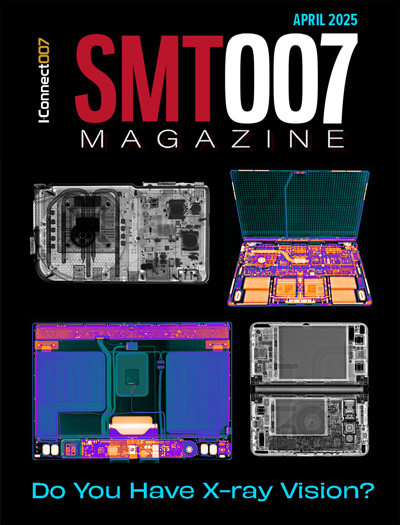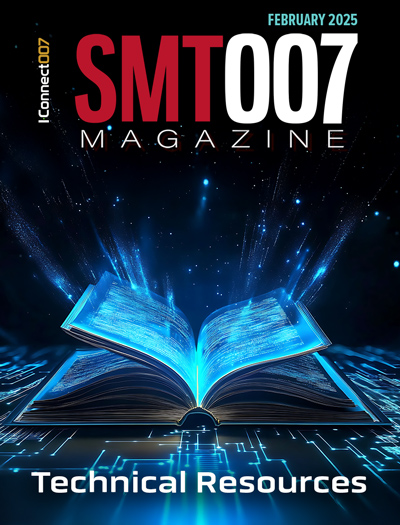-

- News
- Books
Featured Books
- smt007 Magazine
Latest Issues
Current Issue
Do You Have X-ray Vision?
Has X-ray’s time finally come in electronics manufacturing? Join us in this issue of SMT007 Magazine, where we answer this question and others to bring more efficiency to your bottom line.

IPC APEX EXPO 2025: A Preview
It’s that time again. If you’re going to Anaheim for IPC APEX EXPO 2025, we’ll see you there. In the meantime, consider this issue of SMT007 Magazine to be your golden ticket to planning the show.

Technical Resources
Key industry organizations–all with knowledge sharing as a part of their mission–share their technical repositories in this issue of SMT007 Magazine. Where can you find information critical to your work? Odds are, right here.
- Articles
- Columns
Search Console
- Links
- Media kit
||| MENU - smt007 Magazine
RIKEN Adopts Siemens' Emulation And High-Level Synthesis Platforms for Next-Generation AI Device Research
January 16, 2025 | SiemensEstimated reading time: 2 minutes
Siemens Digital Industries Software announced today that RIKEN, a national research and development agency in Japan, is enhancing its research on next-generation AI devices with Siemens' comprehensive Veloce™ Strato CS emulation and Catapult™ High-Level Synthesis (HLS) platforms to conduct architecture and design space exploration of AI accelerator devices.
“RIKEN’s adoption of Siemens’ emulation and HLS capabilities enables the team to conduct the necessary explorations during our research into next-generation AI devices for ‘AI for Science’ and maintain our position as the creators of the world’s most powerful supercomputer,” said Dr. Kentaro Sano, team leader of the Processor Research Team at the Center for Computational Science, RIKEN. "Our goal is the establishment, management, and continuous enhancement of the computational infrastructure essential for the creation of generative AI models tailored for scientific discoveries – and Siemens’ tools play an essential role in this research.”
The RIKEN Center for Computational Science, part of Japan’s largest research organization for computational science and a world leader in a diverse array of scientific disciplines, is known for developing supercomputers such as the K computer and Fugaku.
Dr. Kentaro Sano, team leader of the Processor Research Team at RIKEN Center for Computational Science (right) and Yukio Tsuchida, vice president for Japan, Electronic Design Automation, Siemens Digital Industries Software (left)
"We are delighted to support RIKEN's groundbreaking research on AI devices. Our latest Veloce Strato CS and Catapult HLS platforms provide RIKEN with the comprehensive tools to achieve their research goals and drive innovation in the field of AI," said Jean-Marie Brunet, vice president and general manager, Hardware-Assisted Verification, Siemens Digital Industries Software
"Siemens is incredibly proud to support the cutting edge research and development taking place at RIKEN, and we look forward to supporting the organization as it works to achieve its goals to explore the outer boundaries of what’s achievable when bringing the power of AI to scientific research at vast scale," said Yukio Tsuchida, vice president for Japan, Electronic Design Automation, Siemens Digital Industries Software.
The combination of Siemens’ hardware-based Veloce Strato CS and Catapult HLS platforms provide RIKEN with world-class technology for enabling rapid synthesis and emulation of large-scale Application Specific Integrated Circuits (ASICs). These Siemens tools support RIKEN's efforts in evaluating the performance of optimized AI computing circuits and the system-on-chips (SoCs) that incorporate these circuits. The AI accelerator developed through this research will be a candidate for deployment in the next-generation supercomputers following the supercomputer Fugaku , scheduled to start operation around 2030 at the latest.
Suggested Items
University of Arizona Pioneering Technical Education Beyond Semiconductors
04/18/2025 | Marcy LaRont, PCB007 MagazineWhile many universities struggle to keep their curriculum up to date with the evolving needs of the electronics industry, the University of Arizona stands head and shoulders above the others. Its Center for Semiconductor Manufacturing incorporates five of the colleges at UA and emphasizes an interdisciplinary approach to prepare students for diverse careers in technology and manufacturing.
Lam Research Donates Leading-Edge Etch System to Accelerate Nanofabrication R&D at UC Berkeley
04/17/2025 | PRNewswireLam Research Corp. announced the donation of its innovative multi-chamber semiconductor etching system to the Marvell Nanofabrication Laboratory at the University of California, Berkeley to advance research and development (R&D) for next-generation chip technologies.
PCBAIR Invests in AI to Enhance Defect Prediction in PCB Manufacturing
04/11/2025 | PRNewswirePCBAIR, a leading provider of PCB manufacturing and assembly services with fully automated production lines, announced that it is increasing funding for research and development to incorporate AI into its manufacturing processes, dramatically improving defect prediction accuracy and efficiency.
Roke Secures Long-Term UK Missile Defence Centre Science and Technology Framework Contract
04/07/2025 | RokeRoke has been awarded a major multi-year contract known as Science & Technology Oriented Research & development in Missile defence (STORM), partnering with the UK Missile Defence Centre (MDC) to deliver cutting-edge research for Missile Defence.
BrainChip Partners with RTX’s Raytheon for AFRL Radar Contract
04/03/2025 | BUSINESS WIREBrainChip Holdings Ltd, the world’s first commercial producer of ultra-low power, fully digital, event-based, neuromorphic AI, today announced that it is partnering with Raytheon Company, an RTX business, to service a contract for $1.8M from the Air Force Research Laboratory on neuromorphic radar signaling.


